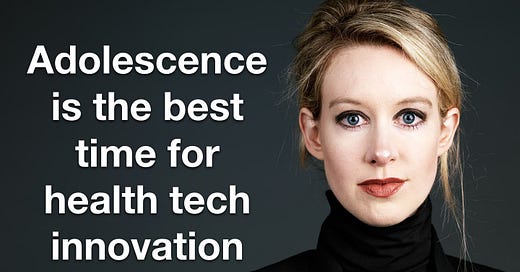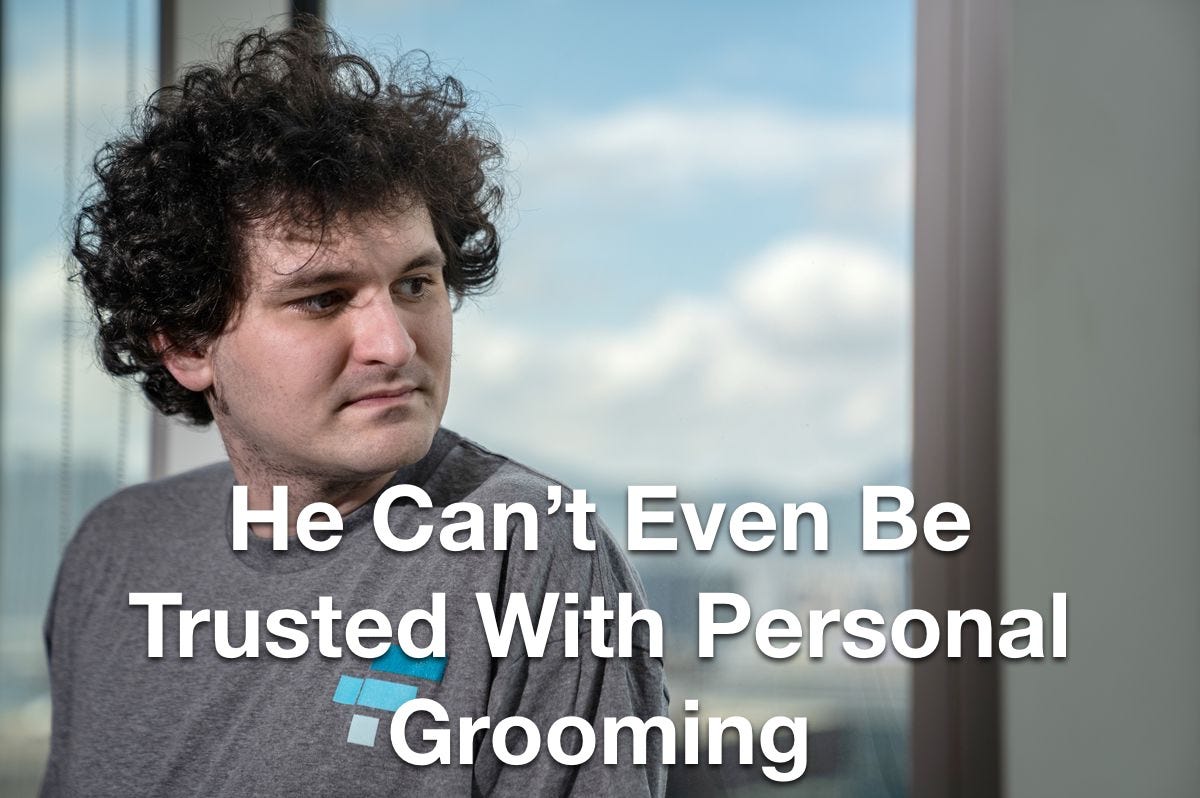I’m giving a grand rounds today, so we will all have to make do with a classic. In honor of Deepseek, and yesterday's $1.something trillion dollar plunge in capital markets (when everybody realizes there is a dramatically cheaper way to do AI), we return to a classic scam of modern healthcare. Yes, it's our now imprisoned Friend, Elizabeth Holmes. Theranos was a company that promised disruptive innovation in laboratory testing. A strange woman, blonde, intense, with a bizarrely low pitched vocal affectation, was taken completely seriously as she explained that, despite the laws of physics and human biology, everything we needed to know would come from a single drop of blood. She surrounded herself with eminent men, many of whom had military or political backgrounds, and none of them had any experience in health, biosciences, or anything relevant to the actual production of a laboratory product. This was all before a scams like cryptocurrency took over the world, which everybody knew were scams, and we just got comfortable with the fact that our entire economy as a giant pump and dump. No, at the dawn of Theranos, people still wanted to convince themselves that something was real, as opposed to convincing themselves that they were gonna get out before all the other fools. It's quaint, in a way. We wanted to believe Elizabeth Holmes. We wanted to believe that a single drop of blood would do something useful. In retrospect, it feels like the one room schoolhouse of investor fraud. Without further do, an argument for why all of that was actually a “good investment.”
The first thing to realize is that I’m not just writing this article to be provocative. This is not just click bait1. I really do think “Theranos” tech—what they actually built—is a hot opportunity for investors in health tech, if it weren’t for the obvious imprisoned-founder problem. I also think that the government‘s prosecution of Elizabeth Holmes, although clearly demonstrated in a court of law to be justified, was misguided in important respects.
Did Theranos succeed as a company? Well, no. That’s why it’s a great investment opportunity! Theranos’ technology is nothing if not undervalued at this point. The Edison was able to do one or two tests, plausibly.
Let’s take the approach of an alien from another planet, who happens to be a venture investor. Thus, we can pretend we don’t know that Elizabeth Holmes and Theranos are synonymous with “cautionary tale for lying bullsh*t” and look at it with fresh eyes.2
Are You F-Ing Kidding Me?
Early-stage health-tech investors are not investing in what they imagine to be sure things. All of venture investing is extremely high risk. There is a reason that you need to be an accredited investor to lawfully burn money in venture investing. And that reason is not because it’s a sure thing. The reason is because it’s a great way to lose all your money. The accredited investor standard is antiquated, but it is one tiny backstop against complete con-humans stealing money from people who can’t afford to have it as readily stolen as Betsy DeVoss and Rupert Murdoch.
Accredited investor equals rich enough to be scammed without us being too sad about it.
So what are venture investors doing if it’s so risky? The answer is, in addition to “really adding value,” is they are hoping their investment will 50x in value.
@VCBraggs has some good points.
Most venture investments lose money. Those who make a lot of money do so in a fashion similar to that of lottery tickets—it’s rare and newsworthy. Except you can make more than the lottery and not lose it all to taxes. But the odds are not that different.
So, when early-stage investors were looking at Theranos, they were making a calculation in their heads. That calculation is not any of the following:
Will this idea work?
Will this founder successfully execute, in all likelihood?
Am I confident that I will get my money back?
Is this a team I can believe in?
Is this a problem that needs solving?
It’s counterintuitive. I know.
Venture investors (like
) are looking for the answer to one question:If this founder is able to do what they’re waving their hands about, does it become a fabulously successful billion-dollar-plus company that will have an exit that makes me $50 for every $1 I invest?
It ends up being about market sizing and potential, not probability. This is high stakes poker, and what they are calculating is not whether they will win, but how much they will win. It’s an elaborate exercise in calculating pot odds with a terrible hand.
Given the above, that is the most important question for early stage venture capital. There are obviously other things that go into it, but without the answer to that question being yes, it’s not a venture investment. This is why venture backs things that make tons of money, not just a lot of money. If they just wanted a lot of money they’d buy index funds on the public market and wait.
Most of the due diligence process is related to the first list of questions above leading to non-obvious answers. If the answers were obvious, it wouldn’t be a good deal for the investor, because everyone else would see it also. I’m going to answer my own questions using Theranos as the example:
Will this idea work? Being able to do blood tests with a tiny drop of blood is a really technically difficult problem to solve. So, it’s unlikely that everything Theranos promised could have been done in the machine they created, the Edison. Anyone doing real due diligence would’ve noticed that the second law of thermodynamics would have prevented the mini-lab from working. This is just based on the laws of physics. The size of the machine was too small. The heat generated from making Elizabeth’s dream of “everything in one tiny box” was too much to be physically possible. However, just like when Travis Kalanick got fired from Uber, Kyle Robertson got fired from Cerebral, and Adam Neumann got fired from WeWork, founders don’t need to be entirely correct to build something that can be made valuable by a strategic board decision to get rid of them when they fail as business leaders.
Will this founder successfully execute, in all likelihood? Elizabeth Holmes was a remarkable founder. She was able to raise money in a way that is rare. She was able to build a board that had both no technical experience and endless credibility. She was completely obsessed with the problem, and was willing to dedicate every ounce of her being to the company. It turns out every ounce of her being didn’t include flexibility, humility, or good sense, and that’s the kind of risk you run with a 19-year-old who thinks they can build a blood testing company. That is exactly the kind of orthogonal thinking that makes venture investors so much goddamn money if they do it right. And loses them so much on average on every other deal.
Am I confident that I will get my money back? Heavens, no. Once you’ve written a venture capital investment check, that money is dead and gone. If you thought you were getting your money back, you should’ve just opened a RobinHood account and dropped it into an index fund.
Is this a team I can believe in? It kind of doesn’t matter. What you’re looking for is if other people think it’s a team that can be believed in. Having generals on the board kind of does that for anybody. What the hell is Henry Kissinger doing here? Being market validation, that’s what. Elizabeth went long on market validation and short on expertise.
Is this a problem that needs solving? Again, tiny blood drop testing is helpful-ish. But, in fairness, there is some version of this problem that needs solving. The market Theranos is looking to disrupt is a large one. Are the current incumbent players huge and profitable? Yes. Does everyone love LabCorp and Quest? No. Is this a financially beneficial problem to solve? Yes. Because it’s a huge market.
See how that kind of thinking works? I think given the information early-stage investors had at the time, investing in Theranos made perfect sense then, and would make perfect sense if presented with the same thing (absent the history of fraud) today.
But What About Later?
I have listened to every podcast episode of Out for Blood, watched the HBO documentary on Theranos several times, and I even personally know the contractor who wrote some of the Theranos paperwork for patent office submission in the first place.
Elizabeth Holmes lied to investors and put patients in harm’s way. This is not OK. This is in no way OK. This is why Healthcare investing that interfaces with patient care is a completely different game. It’s different in terms of seriousness, risk, and ethical responsibility when compared to any other silicon valley HandWavery3. Keep in mind, Elizabeth Holmes wasn’t thinking about physician-oaths and responsibility and ethical obligations and patients.
She was not a doctor. She was an adolescent. She was comparing herself to Thomas Edison and doing her best Steve Jobs impression in the mirror every morning. Those individuals were very strange, and she was very strange.
FAKING IT till you make it is normative in Silicon Valley. Traction hacks are normal. I shudder to think how normative4 it is to commit what would otherwise be understood as fraud if brought to court. So much near-fraud ends up being bold promises… with eventual follow-up or complete collapses and nobody noticing because that’s what happens to most venture-backed companies.
At the end of the day, I think the technology that Theranos actually built—the ability to do even one reliable test that people might need with a fingerstick in a Walgreens—is actually pretty valuable. If we could have done that with Covid a lot earlier, we would’ve been in better shape. If we could do it with STD testing now we would be in great shape. If we could do it with blood glucose now we would be in great shape (wait—we do!).
A one-test Theranos machine would be awesome. If anyone would like to buy that intellectual property and give it to me, I’m ready to commercialize it. Until then, I hope Elizabeth’s time in jail treats her well5. I hope Sam Bankman-Fraud ends up punished legally too. But please, dear readers, don’t think this is not normal Silicon Valley behavior. It is.

And it will continue till we demand otherwise—and use verification in public, I don’t know, like on a blockchain or something, so that we don’t have to wonder what’s going on behind closed doors. We can all see perfectly clearly. If there was ever a time for a public ledger, it’s in the finances and governance of startups founded by people we laud as brilliant do-gooders.
Invest your money somewhere safe, like by subscribing to this Substack. It’s guaranteed to be worth nothing to you, but leave you feeling ok, which is more than I can say for Theranos or FTX investors or customers.
—O. Scott Muir, M.D.
Of course it’s clickbait. But it’s not only clickbait. Or at least that’s my contention.
I’m going to use the format of the “alien-investor diligence” to assess the opportunity, and hopefully I can explain my rationale in a way that doesn’t make any of you think I’ve been abducted by literal aliens.
“Hand Wavery” is my made up term for the corporate equivalent when it comes to handwaving that a brewery is to beer.
Sam Bankman-Fraud—see what I did there?
This isn’t sarcasm. I think if you’re not into prison, you have to not be in prison for people who should be in prison. I think we imprison too many people and I don’t think it’s a great way to treat humans.





